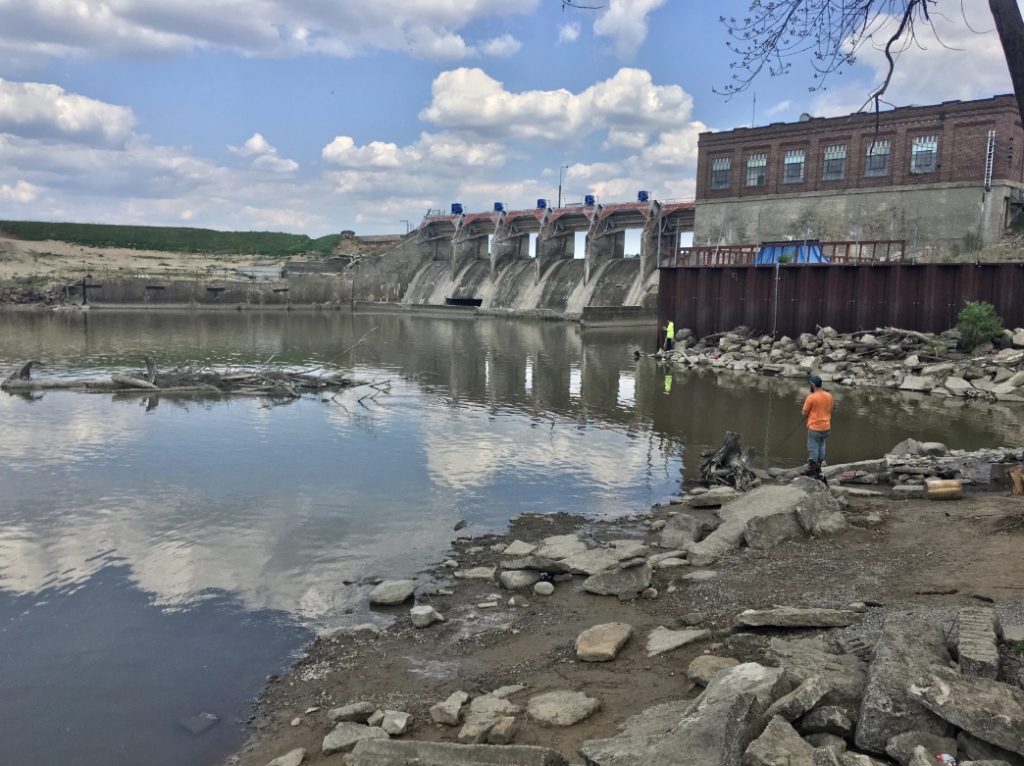The Metro: What’s downstream for dam removal in Michigan’s rivers?
David Leins The Metro October 15, 2025Old hydroelectric dams are still installed along the Rouge and Huron Rivers, but they’re crumbling and it’s time to repair them, or remove them.

The Tittabawassee River no longer flows over the Sanford Dam after a flood damaged the dam in 2020. Now, the river flows around the embankment and pools at its bottom.
Southeast Michigan’s streams and rivers are studded by shadows of our industrial past. Henry Ford brought mass production of vehicles to the world, and he needed energy to power his industry.
Old hydroelectric dams are still installed along the Rouge and Huron Rivers, but they’re crumbling and it’s becoming time to repair them, or remove them.
In Michigan, the fate of these aging dams is still hotly debated in town halls and city council meetings. One of those place is Flat Rock, MI, where residents and local officials urged Huron-Clinton Metroparks not to remove the dam.
While the fate of Flat Rock Dam is still uncertain, 120 dams have been removed in Michigan, according to a database published by American Rivers, a river restoration nonprofit.
And dam removal brings a number of benefits for the waterway and surrounding areas, including: biodiversity and fish passage, water quality, and mitigation of catastrophic flooding in the case of dam failure.
So, what’s next for Michigan’s dams and rivers? What options do residents and lawmakers have? And, what opportunities are ahead for the Great Lakes state?
Elizabeth Riggs, the Great Lakes Regional Director for American Rivers, joined Robyn Vincent on the Metro to discuss.
Listen to The Metro weekdays from 10 a.m. to noon ET on 101.9 FM and streaming on demand.
Subscribe to The Metro on Apple Podcasts, Spotify, NPR.org or wherever you get your podcasts.
Trusted, accurate, up-to-date.
WDET strives to make our journalism accessible to everyone. As a public media institution, we maintain our journalistic integrity through independent support from readers like you. If you value WDET as your source of news, music and conversation, please make a gift today.Donate today »
Authors
-
 David Leins is the senior producer of WDET’s daily news and culture program, The Metro. He has produced several award-winning podcasts and multimedia series at WDET including Tracked and Traced, Science of Grief and COVID Diaries, which earned a National Edward R. Murrow Award for Excellence in Innovation. He previously led WDET’s StoryMakers program. David has an M.A. in Media Arts and Studies from Wayne State University, and a B.A. in anthropology from Grand Valley State University with a minor in Arabic. David teaches podcasting at Wayne State University and is an alumnus of the Transom Audio Storytelling Workshop.
David Leins is the senior producer of WDET’s daily news and culture program, The Metro. He has produced several award-winning podcasts and multimedia series at WDET including Tracked and Traced, Science of Grief and COVID Diaries, which earned a National Edward R. Murrow Award for Excellence in Innovation. He previously led WDET’s StoryMakers program. David has an M.A. in Media Arts and Studies from Wayne State University, and a B.A. in anthropology from Grand Valley State University with a minor in Arabic. David teaches podcasting at Wayne State University and is an alumnus of the Transom Audio Storytelling Workshop.



